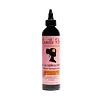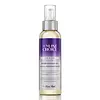What's inside
What's inside
 Key Ingredients
Key Ingredients

 Benefits
Benefits

 Concerns
Concerns

 Ingredients Side-by-side
Ingredients Side-by-side

Emblica Officinalis Fruit Extract
Skin ConditioningSesamum Indicum Seed Oil
EmollientCocos Nucifera Oil
MaskingSimmondsia Chinensis Seed Oil
EmollientOlea Europaea Fruit Oil
MaskingMacadamia Ternifolia Seed Oil
EmollientButyrospermum Parkii Butter
Skin ConditioningTheobroma Cacao Seed Butter
EmollientHoney
HumectantBiotin
AntiseborrhoeicDimethyl Sulfone
SolventAhnfeltia Concinna Extract
Skin ConditioningSapindus Mukorossi Fruit Powder
Bacopa Monnieri Extract
Skin ConditioningEclipta Prostrata Extract
Skin ConditioningMelaleuca Alternifolia Leaf Oil
AntioxidantBehentrimonium Methosulfate
Emblica Officinalis Fruit Extract, Sesamum Indicum Seed Oil, Cocos Nucifera Oil, Simmondsia Chinensis Seed Oil, Olea Europaea Fruit Oil, Macadamia Ternifolia Seed Oil, Butyrospermum Parkii Butter, Theobroma Cacao Seed Butter, Honey, Biotin, Dimethyl Sulfone, Ahnfeltia Concinna Extract, Sapindus Mukorossi Fruit Powder, Bacopa Monnieri Extract, Eclipta Prostrata Extract, Melaleuca Alternifolia Leaf Oil, Behentrimonium Methosulfate
Glycine Soja Oil
EmollientRicinus Communis Seed Oil
MaskingPrunus Amygdalus Dulcis Oil
Skin ConditioningParfum
MaskingOryza Sativa Bran Extract
Skin ConditioningOryza Sativa Bran Oil
EmollientRosmarinus Officinalis Leaf Extract
AntimicrobialHelianthus Annuus Extract
EmollientHelianthus Annuus Seed Oil
EmollientAloe Barbadensis Leaf Juice
Skin ConditioningApium Graveolens Seed Extract
AntioxidantChamomilla Recutita Flower Extract
MaskingSalvia Officinalis Leaf Extract
CleansingCocos Nucifera Oil
MaskingOenothera Biennis Oil
EmollientVitis Vinifera Seed Oil
EmollientSimmondsia Chinensis Seed Oil
EmollientMelaleuca Alternifolia Leaf Oil
AntioxidantUrtica Dioica Leaf Extract
Skin ConditioningLinum Usitatissimum Seed Extract
PerfumingSalvia Hispanica Seed Extract
EmollientBiotin
AntiseborrhoeicArginine
MaskingPanthenol
Skin ConditioningTocopherol
AntioxidantTocopheryl Acetate
AntioxidantAscorbic Acid
AntioxidantGlycerin
HumectantCaprylic/Capric Triglyceride
MaskingWater
Skin ConditioningItaconic Acid
AntimicrobialPolyglyceryl-10 Laurate
Skin ConditioningMenthyl Ethylamido Oxalate
Skin ConditioningSilica
AbrasiveCitric Acid
BufferingPhenoxyethanol
PreservativePotassium Sorbate
PreservativeSodium Benzoate
MaskingAmyl Cinnamal
PerfumingBenzyl Benzoate
AntimicrobialHexyl Cinnamal
PerfumingLinalool
PerfumingGlycine Soja Oil, Ricinus Communis Seed Oil, Prunus Amygdalus Dulcis Oil, Parfum, Oryza Sativa Bran Extract, Oryza Sativa Bran Oil, Rosmarinus Officinalis Leaf Extract, Helianthus Annuus Extract, Helianthus Annuus Seed Oil, Aloe Barbadensis Leaf Juice, Apium Graveolens Seed Extract, Chamomilla Recutita Flower Extract, Salvia Officinalis Leaf Extract, Cocos Nucifera Oil, Oenothera Biennis Oil, Vitis Vinifera Seed Oil, Simmondsia Chinensis Seed Oil, Melaleuca Alternifolia Leaf Oil, Urtica Dioica Leaf Extract, Linum Usitatissimum Seed Extract, Salvia Hispanica Seed Extract, Biotin, Arginine, Panthenol, Tocopherol, Tocopheryl Acetate, Ascorbic Acid, Glycerin, Caprylic/Capric Triglyceride, Water, Itaconic Acid, Polyglyceryl-10 Laurate, Menthyl Ethylamido Oxalate, Silica, Citric Acid, Phenoxyethanol, Potassium Sorbate, Sodium Benzoate, Amyl Cinnamal, Benzyl Benzoate, Hexyl Cinnamal, Linalool
Alternatives
Ingredients Explained
These ingredients are found in both products.
Ingredients higher up in an ingredient list are typically present in a larger amount.
Biotin is a B vitamin that is naturally produced by our bodies. It is also called Vitamin H.
Our bodies use biotin in the metabolism process. It also helps our bodies use enzymes and move nutrients around. A biotin deficiency can lead to brittle hair and nails.
More research is needed on applying biotin topically. However, taking biotin orally has been shown to help nourish the skin, hair, and nails. They play a role in forming skin-hydrating fatty acids.
Biotin is water-soluble. It can be found in foods such as fish, eggs, dairy, nuts, and meat. Vitamin H stands for "haar" and "haut". These are the German words for hair and skin.
Learn more about BiotinCocos Nucifera Oil is obtained from the kernels of the coconut fruit. In other words, this is coconut oil.
Coconut Oil is rich in fatty acids with lauric acid making up the majority of these. It also contains linoleic acid. Due to this high fatty acid content, coconut oil helps trap moisture and soften skin.
Despite being antibacterial, coconut oil may not be great for acne-prone skin. It is comedogenic and may clog pores. This ingredient may not be safe for malassezia or fungal acne.
Note: Coconut Oil should not replace your sunscreen for UV protection. Studies show it only blocks about 20% of UV.
This oil is non-volatile and has a light scent.
The term 'fragrance' is not regulated in many countries. In many cases, it is up to the brand to define this term. For instance, many brands choose to label themselves as "fragrance-free" because they are not using synthetic fragrances. However, their products may still contain ingredients such as essential oils that are considered a fragrance.
Learn more about Cocos Nucifera OilThis tea tree oil comes from the leaves of the Tea Tree plant. Tea tree oil has antioxidant, anti-inflammatory, and antimicrobial properties.
According to the book Journal of Profiles of Drug Substances, tea tree helps in reducing acne-causing bacteria such as Propionibacterium acnes. This is due to the Terpinen components of tea tree oil.
Tea tree may cause sensitivity and irritation for some people. This oil naturally contains fragrance such as linalool and limonene.
However, research shows irritation usually occurs when using pure tea tree oil and not in cosmetic products.
Tea tree oil was found to help relieve the symptoms of psoriasis in one study.
Tea tree oil is toxic when ingested. Another study showed it to caused damage to the nervous system of dogs and cats when applied to their skin or given orally.
Learn more about Melaleuca Alternifolia Leaf OilThis oil comes from the seeds of the desert shrub called Jojoba. It is more commonly known as jojoba oil, a non-comedogenic oil.
Jojoba oil does not contain fragrance and has many fatty-acids, making it a great soothing ingredient.
It also contains Vitamin E, a great moisturizing ingredient. Vitamin E is also an antioxidant and protects your skin against oxidative damage.
This ingredient humectant properties, meaning it helps draw moisture from the air. This helps keep your skin hydrated.
While jojoba has antibacterial properties, it is only able to kill some strains of bacteria.
Studies also show it helps in wound healing. In fact, Indigenous cultures have used jojoba as a moisturizer and to help treat burns for centuries.
Fun fact: Jojoba oil similar to natural human skin sebum, so it has a great effect on dry skin. It is also promising with helping to regulate sebum production.
Due to its fatty acid content, Jojoba oil may not be fungal acne safe. We recommend speaking with a professional if you have any concerns.
Learn more about Simmondsia Chinensis Seed Oil